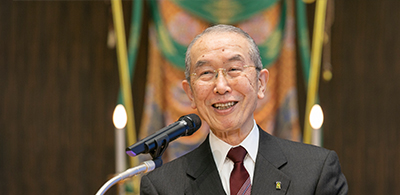Practicing Kindness
March 2014

Thinking of Others
Very recently, I happened to look at a flower calen-dar and saw that the flower for March 5, the anniversary of the founding of Rissho Kosei-kai, is the iris, which in the language of flowers is said to express a kind heart and mind.
For the past few years, we members have been attaching importance to being “cheerful, kind, and warmhearted.” While it may only be a coincidence that such an appropriately symbolic flower appears on our anniversary, this is a good opportunity to think anew about the meaning of kindness.
Shakyamuni, realizing that he would die from the food prepared for him by the blacksmith’s son Chunda and not wanting him to be accused of making Shaykamuni fatally ill and become remorseful over the offering he had made, had his disciple Ananda tell him, “Shakyamuni says that as he will enter nirvana because of this last offering of food you have brought him, you will earn great merit.”
This is a story that teaches us how to sympa-thize with other people’s sadness and suffering and to show them heartfelt consideration, which is, in other words, the highest form of kindness. From the aspect of understanding the sadness of others, we all have the same hearts and the same minds. Even though that is so, we may think we are inca-pable of being like Shakyamuni. In that regard, the following is what Shakyamuni teaches us.
Make friends with everyone and bring joy to them. Show consideration for suffering people and extend a helping hand. Pray for the happiness of other people and rejoice with them. Free yourself from attachments and be kind to everyone and everything equally. This means that by practicing the heart and mind of benefiting others, namely the four immeasurably spreading principles of loving-kindness, compassion, sympathetic joy, and equanimity, you will, of your own accord, become kind toward other people.
Happiness from Being Kind
We often say, “Be firm with yourself and be kind to others.” Confucian tradition as well teaches that the way for humanity is to be a step ahead of others in worrying about the world and to be the last in taking pleasure from it, as seen in the words of the Chinese poet and government official Fan Zhong-yan (989- 1052), “Be first in anxiety and last in pleasure.” When we really think about this, we cansee that being kind to others and developing our hearts and minds are two sides of the same coin. For us to be truly kind to others requires a firm basis of sincerity and humility that are revealed naturally in our personality, and generosity and rigor coming from consideration toward the other person.
An important condition for drawing out and developing the emotional and mental potential for kindness, Founder Niwano has noted, is a religious atmosphere in the home. That is because this can help develop the family members’ reverence and respect for the great being that cannot be seen by the naked eye, and foster a sense of humility and generosity.
Furthermore, regarding the things that are near-est to us, by raising plants and flowers or taking care of pets, and by experiencing both the joy of showing them genuine affection as well as the pain of separation, we can thereby develop a heart and mind that can accept sadness and suffering with sensitivity.
And then, above all else, we are able to become kind toward other people while we are being illuminated by the Dharma and polished in the sangha.
One person, when coming to terms with the time left to live, said, “By learning the Buddha’s teach-ings, I could lead the most wonderful life,” and went on to add that experiencing the most wonderful life meant being able to be kind to others. When I heard this story about someone who, in the last years of life, felt happy and proud to be able to become kind, I was reminded that kindness is based on attaching importance to a heart and mind that are cheerful, kind, and warm, in taking the hand of people who are experiencing difficulties, and in together cultivating each other’s hearts and minds by taking refuge in the Dharma.
This year marks the fiftieth anniversary of the inauguration of the Great Sacred Hall in Tokyo, and in keeping with ancient customs, I will celebrate my 77th birthday, a joyous, auspicious occasion of longevity called in Japanese kiju, the year of joy. Hereafter, with a heart and mind full of gratitude, I hope to continue to diligently practice the Way together with all of you.
Back Number



